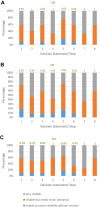Content Validation of an Algorithm for the Assessment, Management and Monitoring of Drug-Induced QTc Prolongation in the Psychiatric Population
- PMID: 34848960
- PMCID: PMC8612668
- DOI: 10.2147/NDT.S334350
Content Validation of an Algorithm for the Assessment, Management and Monitoring of Drug-Induced QTc Prolongation in the Psychiatric Population
Abstract
Background: QTc interval (QTcI) prolongation leads to serious complications, making it a concern for clinicians. Assessing the risk of QTcI prolongation in the psychiatric population is important because they are exposed to multiple medications known to increase the risk of life-threatening arrhythmias.
Aim: The study aims to validate the content of an algorithm for the assessment, management and monitoring of drug-induced QTc prolongation in the psychiatric population.
Methodology: Qualitative semi-structured interviews of cardiologists, to gather information regarding their approach in assessing the risk of drug-induced QTc prolongation at the time of prescribing. After the interview, an orientation to the algorithm was provided with a link to a cross-sectional, anonymous survey. The online survey included quantitative and qualitative components to gather feedback on the relevance and appropriateness of each step in the algorithm.
Results: Interview responses were incorporated into 4 themes. Responses indicated a lack of a unified protocol when assessing QTcI prolongation, which supports the need of an algorithm that includes a verified risk scoring tool. Quantitative survey results showed a mean score ranging from 3.08 to 3.67 out of 4 for the appropriateness of the algorithm's steps, 3.08 to 3.58 for the safety and 3.17 to 3.75 for the reliability of references used. Additional analysis using the modified kappa and I-CVI statistical measures indicate high validity of contents and high degree of agreement between raters. As per the open-ended questions, cardiologists supported the implementation of the algorithm; however, they recommended simplification of the steps as they appear to be cumbersome.
Conclusion: The results demonstrate that the implementation of the algorithm after minor alterations can prove to be useful as a tool for the risk assessment of QTc prolongation. Further validation of the algorithm with mental health pharmacists and clinicians will be conducted as a separate phase of the study.
Keywords: QTc prolongation; algorithm; drug-induced arrhythmias; psychiatric population.
© 2021 Zolezzi et al.
Conflict of interest statement
The authors report no conflicts of interest in this work.
Figures




References
-
- Correll CU, Solmi M, Veronese N, et al. Prevalence, incidence and mortality from cardiovascular disease in patients with pooled and specific severe mental illness: a large-scale meta-analysis of 3,211,768 patients and 113,383,368 controls. World Psychiatry. 2017;16(2):163–180. doi:10.1002/wps.20420 - DOI - PMC - PubMed
-
- Girardin F, Sztajzel J. Cardiac adverse reactions associated with psychotropic drugs. Dialogues Clin Neurosci. 2007;9(1):92–95.
LinkOut - more resources
Full Text Sources
Research Materials

